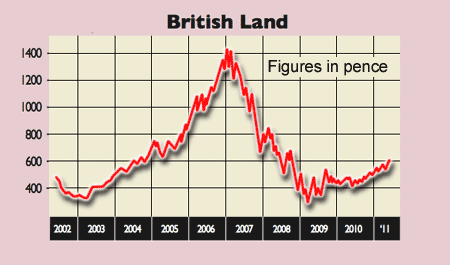
Real-estate firm British Land is doing well, but don’t buy the shares, says David Stevenson.
What is British Land?
British Land is one of Britain’s biggest commercial property landlords, with over 40 million square feet under management. Its portfolio is worth £9.6bn and the firm manages an extra £5.3bn of property assets via investment funds and joint ventures. Two-thirds of its portfolio consists of retail assets – 80% are “prime out-of-town UK sites – some of the best retail assets in the UK”, says the firm. London City and West End offices make up almost all the rest – these are set to account for 37% of the portfolio when current developments are completed.
What’s the firm’s history?
British Land was founded in 1856 by three Liberal MPs to expand the number of eligible voters – then restricted to “landed gentlemen”. But records of the firm’s early property dealings were lost in the Blitz. It was entrepreneur John Ritblat who really built up the portfolio from £37m in 1971 to £1.6bn in 1990. Landmarks such as Broadgate in the City of London and Sheffield’s Meadowhall shopping centre were bought later. For tax reasons British Land moved to REIT (real-estate investment trust) status on 1 January 2007. That was followed by what the firm called “the worst storm in real-estate history” as property prices crashed.
Who runs British Land?
Chief executive since January 2009 is ex-Barclays and Goldman Sachs banker Chris Grigg. Last year he took home £1.8m in salary, benefits and bonus – but his stock options could be worth many times that sum in a few years. The non-executive chairman is London Stock Exchange chairman and one-time BP Group managing director Chris Gibson-Smith.
How’s business been?
The portfolio valuation increased 6.9% for the year to end-March 2011, and rental levels rose 2.7%, far better than the industry average. And because 45% of British Land’s properties are financed with debt, the net asset value (NAV) per share, the standard measure of a REIT’s worth, grew 12.5%. The occupancy rate – another key stat – remained at an impressive 98.5% for UK retail and rose to 98% (from 93%) for offices. Pre-tax profits rose by 10%, with the dividend unchanged.
What’s the outlook?
“While we’ve moved to the ‘Age of Austerity’, consumers are still shopping and good businessess are looking to grow,” says Gibson-Smith. “There is still demand for [our] well-located prime retail and London office assets, and we expect this to continue.”
The analysts
Of the 22 analysts surveyed by Bloomberg, almost 60% are bulls, 27% rate the stock a ‘hold’ and just 14% are sellers. The average price target is 615p. Martin Allen at Deutsche Bank is the most bullish, seeing scope for a rise to 840p. But “British Land’s results look pedestrian” compared with those of Land Securities, says Graham Jones at Arbuthnot Securities. And Nan Rogers at Collins Stewart believes the share could fall 20%. Our view: given a sluggish UK economy, on a premium to net asset value and a 4.4% yield, the shares don’t appeal.
The numbers
Stock market code: BLND
Share price: 592p Market cap: £5.3bn
Consolidated net assets: £5.1bn
Consolidated net debt: £4.4bn
P/E (current year estimate): 19.4
Yield (prospective): 4.4%
Geographic shareholdings: UK 27%, US 26%
Largest shareholder: Blackrock (5.9%)
Directors’ dealings
British Land directors have been steady acquirers of often-small amounts of stock over the last year. The total number of shares bought either in the open market or via the company’s equity plan adds up to 209,465. You can see the timing of the bigger deals on the chart, and details of who bought what are shown in the table. But while this might indicate confidence in the firm’s future, the disposal of an exactly equal number of shares – mainly a sale of 191,780 by Graham Roberts, also shown on the chart – largely offsets that view.
Director and total shares bought:
Chris Grigg: 33,507
Charles Maudsley: 71,252
Timothy Roberts: 14,240
Stephen Smith: 64,240
Nigel Webb: 6,980